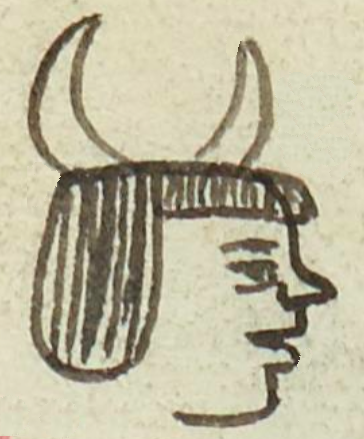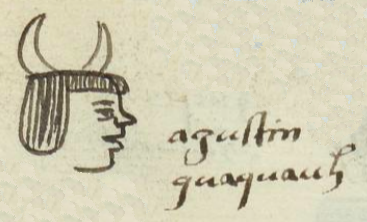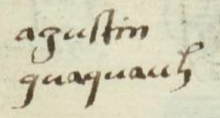Cuacuauh (MH626v)
This personal name glyph, Cuacuauh ("Horned," from cuacuahuitl), shows a man's head with two pointed horns at the top, each one curving inward. The entire glyph is a black-line drawing. The head is shown in profile, facing to the viewer's right. The straight, dark hair on his head consists of bangs on the forehead and hair on the side of his head, covering down to below the ears (which are not visible). The addition of the horns onto the head (cuaitl) of the tribute payer could serve as a phonetic complement, underlining that the name started with Cua-.
Stephanie Wood
The horns [cuacuahuitl are likely the root of the name, given that we are not seeing a horned animal, such as an ox or a bull [cuacuahu(e)], but they could be an abbreviated visual reference to such an animal. Besides being a name attested in Huejotzingo, this name is attested in census records from Cuernavaca in the 1540s. See the link to the name Cuacuauh in our Online Nahuatl Dictionary. Juan José Batalla Rosado (El Arte de Escribir, 2018, 76) includes the cuacuahuitl ("cuerno de animal") in his list of visual loans. He finds the Matrícula de Huexotzinco to show the greatest degree of Western influence of all colonial codices.
Stephanie Wood
1560
Jeff Haskett-Wood
astas, cuernos, animal horns, cattle, oxen, ganado, bueyes, nombres de hombres

cuacuahui(tl), horns, https://nahuatl.wired-humanities.org/content/cuacuahuitl-2
Él con Cuernos, o Él con Astas
Stephanie Wood
Matrícula de Huexotzinco, folio 626v, World Digital Library, https://www.loc.gov/resource/gdcwdl.wdl_15282/?sp=335st=image.
This manuscript is hosted by the Library of Congress and the World Digital Library; used here with the Creative Commons, “Attribution-NonCommercial-ShareAlike 3.0 License” (CC-BY-NC-SAq 3.0).






